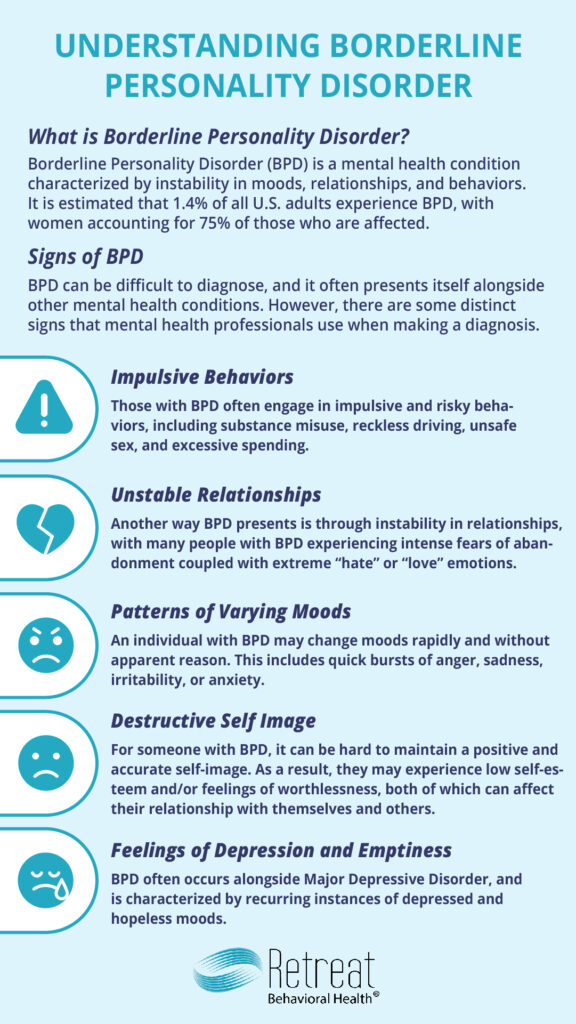BPD Awareness Month—Here’s What to Know

It’s May, which means that it’s also BPD Awareness Month. This annual event was created by the U.S. House of Representatives in 2008, largely in response to awareness efforts led by the National Education Alliance for Borderline Personality Disorder (NEABPD). A decade-plus later, BPD Awareness Month remains a crucial opportunity to educate the general public on what BPD is—as well as show support for those who are living with it.
Is BPD Common?
It is estimated that about 1.4% of the U.S. adult population has BPD, and that 75% of those with the condition are women.
BPD stands for Borderline Personality Disorder, and it is among the most misunderstood of all mental conditions. This is largely due to the fact that it can present itself in many ways, though it is normally characterized by unstable and unpredictable moods and behaviors, including intense episodes of anxiety, depression, or anger.
Some quick things to know about BPD:
- This condition can be difficult to diagnose, and it often occurs alongside other mental health conditions, including substance use disorders and major depressive disorder.
- Those with BPD die by suicide at much higher rates than the general population.
- BPD likely has a strong genetic component, with up to 68% of cases estimated to be inherited.
Borderline Symptom List
One major goal of BPD Awareness Month is to educate people on what Borderline Personality Disorder looks like and how to identify it. This is partially due to how tough it can be to pin down the precise symptoms, as well as the widespread misconceptions about what BPD is.

Some of the most common signs and symptoms of this illness include:
- Emotional instability and mood swings
- Distorted self-image and low self-esteem
- Impulsive and risky behaviors, including substance misuse and reckless driving
- Self harm and suicidal thoughts
- Difficulties maintaining healthy relationships
- Intense fear of abandonment
Common Treatments for BPD
Another important component of Borderline Personality Disorder Awareness Month is letting people know that help and treatment are available.
Experts agree that a comprehensive, integrated plan is key to effective BPD treatment. This usually includes three main components:
Medication – There are no specific BPD medications, but there are certain types of drugs that are commonly used in its treatment, such as antidepressants, antipsychotics, and anti-anxiety medications.
Psychotherapy – There are many types of talk therapy that may be useful in treating Borderline Personality Disorder, including Cognitive Behavioral Therapy (CBT) and Dialectical Behavior Therapy (DBT).
Peer Support – Family and peer support is a crucial part of BPD therapy, since those with the disorder usually exhibit severe perceived instability in their relationships. This may include family therapy, as well as other peer support resources.
Want to Participate in BPD Awareness Month?
There are various things that you can do throughout this month and beyond to show your support for those with BPD and help educate others on the realities of this condition. If you’re interested, here are some ways to get involved.
- Donate to organizations. Help raise money for BPD research, as well as support services for those in need of treatment. Some good organizations to support include the aforementioned NEABPD and the National Mental Health Association.
- Educate yourself. The more that you understand about BPD, the better you can educate others. Dig in to some of the misconceptions surrounding Borderline Personality Disorder and some more of the facts and statistics around the illness.
- Hear from others. Read and/or listen to people’s stories about their experiences with BPD. Not only does this help put a human face on an otherwise clinical disorder, you may also learn something new about the effects that BPD can have on someone’s life.
BPD Awareness Month is a crucial time for spreading the word on Borderline Personality Disorder, including statistics around who it affects and how. If you or a loved one are experiencing BPD, we encourage you to learn more about Retreat Family, and to reach out and schedule a mental health assessment or inquire about our outpatient programs in Florida and Pennsylvania.



